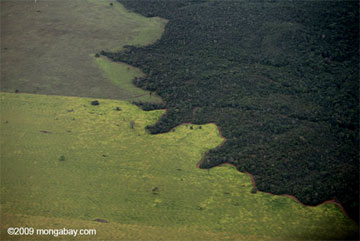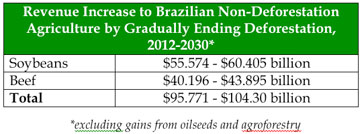Ending Amazon deforestation could boost the fortunes of the Brazilian agricultural sector by $145-306 billion, estimates a new analysis issued by Avoided Deforestation Partners, a group pushing for U.S. climate legislation that includes a strong role for forest conservation.
The analysis, which follows on the heels of a report that forecast large gains for U.S. farmers from progress in gradually stopping overseas deforestation by 2030, estimates that existing Brazilian farmers could see around $100 billion from higher commodity prices and improved access to markets. Meanwhile landholders in the Brazilian Amazon—including ranchers and farmers—could see $50-202 billion from carbon payments for forest protection. The assessment does not account for gains from payments for other ecosystem services, agroforestry, or expansion of oil palm plantations on degraded lands in the region.
 
|
“Tropical forest protection can spur better use of existing agricultural lands – such as adoption of superior breeding stock and improved grazing plans in the cattle sector – while also making Brazilian beef more attractive to global consumers looking to ensure the products they consume aren’t tied to deforestation,” states the analysis, which notes that the earlier report looked only at the U.S. impact of ending tropical deforestation.
“That report was not an economic analysis of the impact of tropical forest protection on tropical countries such as Brazil and Indonesia, and should not be interpreted as such,” says the new analysis.
“A review of the data compiled for this report and other published research shows that Brazilian agriculture, and agriculture in tropical countries more generally, can benefit significantly from protecting tropical forests. Indeed, it’s important to note that gains to the United States do not mean losses to Brazil. Instead, protecting tropical forests will benefit both countries.”
Brazil is in the midst of an ambitious plan to reduce deforestation 70 percent from 1996-2005 levels by 2018. The plan, which would reduce greenhouse gas emissions by nearly 5 billion tons, calls for raising roughly $20 billion in finance to establish and maintain protected areas, compensate farmers for sparing forests, improve governance and law enforcement, and build sustainable industries in the region.
Related articles
Brazil launches major push for sustainable palm oil in the Amazon
(05/07/2010) Brazilian President Lula da Silva on Thursday laid out plans to expand palm oil production in the Amazon while minimizing risk to Earth’s largest rainforest. The plan, called the Program for Sustainable Production of Palm Oil (O Programa de Produção Sustentável de Óleo de Palma), will provide $60 million to promote cultivation of oil palm in abandoned and degraded agricultural areas, including long-ago deforested lands used for sugar cane and pasture. Brazilian officials claim up to 50 million hectares of such land exist in the country.
Brazil could halt Amazon deforestation within a decade

(12/03/2009) Funds generated under a U.S. cap-and-trade or a broader U.N.-supported scheme to reduce greenhouse gas emissions from deforestation and degradation (“REDD”) could play a critical role in bringing deforestation in the Brazilian Amazon to a halt, reports a team writing in the journal Science. But the window of opportunity is short — Brazil has a two to three year window to take actions that would end Amazon deforestation within a decade.
Brazil’s plan to save the Amazon rainforest

(06/02/2009) Accounting for roughly half of tropical deforestation between 2000 and 2005, Brazil is the most important supply-side player when it comes to developing a climate framework that includes reducing emissions from deforestation and forest degradation (REDD). But Brazil’s position on REDD contrasts with proposals put forth by other tropical forest countries, including the Coalition for Rainforest Nations, a negotiating block of 15 countries. Instead of advocating a market-based approach to REDD, where credits generated from forest conservation would be traded between countries, Brazil is calling for a giant fund financed with donations from industrialized nations. Contributors would not be eligible for carbon credits that could be used to meet emission reduction obligations under a binding climate treaty.